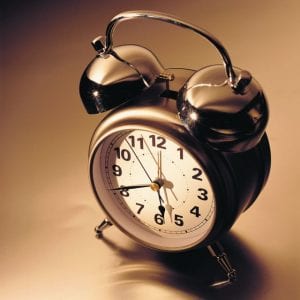Oct
2018
Wakey! Wakey! Adolescents & Delayed Phase Preference (DPP)

My son, as a newborn, was the sleeping envy of all new mothers—this was because he slept. As a toddler, there were no bedtime showdowns. Even through the different stages of elementary school, he went to bed at night and awoke in the morning without protest. But something happened to this child shortly after his eleventh birthday; he seemed to have acquired an inability to get out of the bed in the mornings for school.
As this pattern emerged, the morning family routine became increasingly dysfunctional. There were arguments, hurt feelings, and lots of breakfasts crammed in at the bus stop. By week three of school, I began to worry. Not only had he started middle school, but he started a new middle school—far away from home and with kids he had never met. I wondered if I had made the wrong choice—if this were just a silent protest to his new situation. I talked to him, I listened to him, I interrogated him, and……I believed him—it wasn’t school.
His side of the story: He’s tired, he tries to get out of bed, and there is no understanding on the part of his stepfather how tired he is. He simply can’t get out of bed—his body won’t let him.
My side of the story: If you are tired go to bed earlier, I’m tired too, and I do understand—I understand that getting out of bed is essential to making it to school on time. I get out of bed, my body lets me, and I’m old.
Clearly, we were at a sleep-wake impasse. Then, I came across some interesting research related to puberty and changes in patterns of sleep. I read about something called delayed phase preference (DPP), a sleep pattern characterized by later sleep-wake times.
Here’s what I learned:
- DPP is driven by the biological changes of puberty,
- Melatonin plays a sizable role in DPP,
- Environmental factors contribute to DPP,
- Adolescents are most alert after 3pm and least alert between 8am–9am,
- Different sleep-wake times on weekends vs. weekdays makes the problem worse, and
- DPP usually begins to reverse around age twenty.
It is well know that melatonin plays a considerable role in our sleep-wake pattern. When melatonin levels rise (usually in the evenings), we feel sleepier, and when melatonin levels fall (usually in the mornings), we feel more awake. But the secretion of melatonin means something more for adolescents. The secretion of melatonin plays a role (along with kisspeptin and other hormones) in triggering puberty.
During puberty, the time of night the body releases melatonin changes. As physical maturation progresses, the changes become later and later. In fact, for those adolescents who have completed puberty, the body releases melatonin an average of two hours later than for those who have not yet completed puberty—resulting in the need to stay awake up to two hours later than those who have not yet, or have just started, puberty.
This holistic shift in the melatonin release cycle is fascinating, but unfortunately, the combination of biologically-induced late sleep times and rigid early school wake times cause problems for adolescents—namely sleep deprivation and daytime sleepiness. Sleep deprivation and daytime sleepiness can cause cognitive impairment, poor school performance, poor self-control, obesity, accidents, and even depression, just to name a few. Compounding this problem—the amount of sleep an adolescent requires is still around nine hours a night.
DPP explained exactly what had begun to happen with my usually-easy-sleeping and early-rising child. As I reflected, there was a pattern emerging, of not only difficulty in waking but also a preference for keeping later hours in the evening. Once I understood it was driven by biological factors and not the beginnings of the argumentative stage of boundary-testing autonomy, I began to make adjustments.
1. The family routine became priority number one. Sticking to roughly the same sleep-wake cycle every day—even on weekends. Even on those evenings when sleep is elusive, just lying in bed and “resting” your body is supportive.
2. We began preparing for the next morning the night before, allowing him to squeeze the last bit of sleep from the snooze button. Things such as packing book bags, sports bags, and lunches, as well as taking showers and laying out clothes for the next day.
3. When the sun goes down, the lights—and the devices—go off.
4. Occasionally supplementing melatonin is not out of the question.
All of these adjustments have been time—and sanity—savers. They have also helped honor this DPP biological time of life. Although I have no control over school start times, I can make easing into sleep and transitioning to morning easier for him, as these biological changes are just a part of growing up.